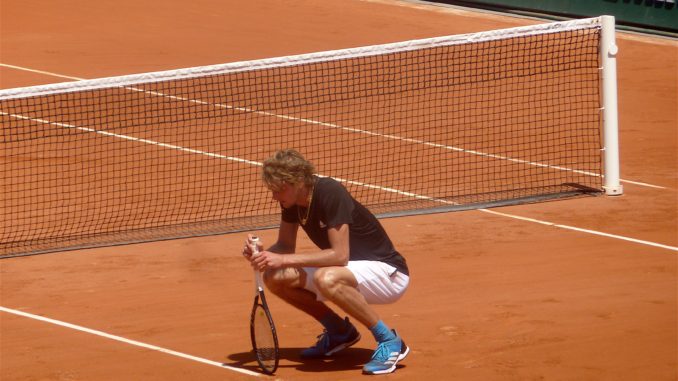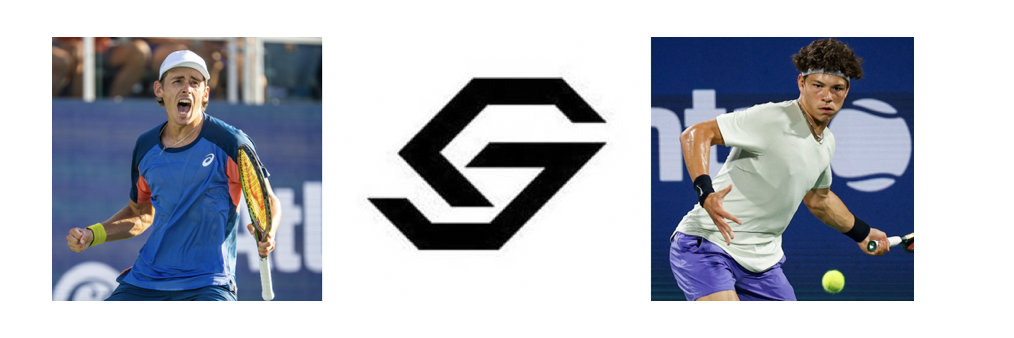
Alexander Zverev and Carlos Alcaraz remain on a collision course for the French Open quarterfinals.
Barely.
Both Zverev and Alcaraz were nearly derailed on Wednesday evening at Roland Garros, but each man saved a match point and eventually survived his respective five-setter. Zverev overcame Sebastian Baez from two sets down before Alcaraz recovered from two sets to one down and erased deficits in both the fourth and fifth against fellow Spaniard Albert Ramos-Vinolas.
Zverev briefly looked like he would see his Parisian fortnight come to an especially swift end. The third-ranked German dropped the first two sets against Baez in routine fashion, getting broken four times in the process. However, he was quick to seize momentum with his back against the wall and one foot on the airplane–“planning my vacation,” he would say afterward. Zverev raced through the second and third sets with the loss of only three games.
That set the stage for a dramatic fifth. Baez took a 4-2 lead, and even though he got broken right back for 4-3 he gave himself a golden chance by holding for 5-4. With the pressure on Zverev, the 21-year-old Argentine earned a match point at 30-40. However, Zverev put a first serve in play and Baez sent a forehand return wide. The No. 3 seed held two points later.
Zverev only grew in confidence from there, producing a flawless final two games to triumph 2-6, 4-6, 6-1, 6-2, 7-5 after three hours and 36 minutes.
“I think he played a very good match, especially in the beginning,” Zverev said of Baez. “I had absolutely no rhythm today in the beginning on that court. It was extremely windy. The conditions were very different [from] the other day, so it took me a while to get into the match. But I knew I had to keep fighting. I knew I had to just find a way.”
The 25-year-old’s press conference quickly turned into a conversation about Alcaraz, because…well…that’s who everyone wants to talk about these days.
“The obvious answer is Alcaraz,” Zverev said when asked about who has the most potential among the youngsters. “He’s No. 6 in the world at the age of 19. We don’t really need to talk about the future a lot. He’s in the present. He’s one of the best players in the world right now.”
When told that Alcaraz was currently losing, Zverev responded, “Is he? I haven’t looked at the score…. I doubt that he will lose.”
Alcaraz didn’t, but like Zverev the Spaniard came within a point of doing so.
Ramos-Vinolas served for the match at 5-4 in the fourth set and brought up match point at ad-in. A missed first serve proved to be costly, as Alcaraz had no trouble getting a second offering back in play after which the veteran left-hander netted a forehand. Alcaraz broke to stay alive two points later.
The 19-year-old dominated the ensuing tiebreaker, but even though he had completely stolen the momentum the fifth set would not be entirely one-way traffic. It was Ramos-Vinolas who surged ahead 3-0, once again forcing his younger but massively favored countryman to play from behind. Time and time again Alcaraz rose to the challenge, reeling off six of the final seven games.
Alcaraz’s comeback was complete with two unbelievable break-point conversions: a running backhand winner at 1-3 followed by a defensive wizardry at 4-4 that invoked memories of the Jimmy Connors-Paul Haarhuis match at the 1991 U.S. Open.
The Miami and Madrid champion served it out one game later, clinching a 6-1, 6-7(7), 5-7, 7-6(2), 6-4 victory with his 10th ace after four hours and 34 minutes.
With that, the Zverev-Alcaraz section of the draw is alive and well.
Barely.


Where has Ramos-Vinolas been with that form?